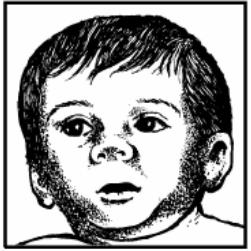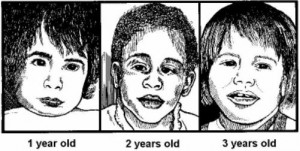a. Infant with fetal alcohol syndrome.
An infant with fetal alcohol syndrome (FAS) is caused by alcohol passing freely through the placental barrier and into the fetal tissue.
The level of alcohol in fetal circulation is about equal to the maternal level.
The fetus nerve cells are affected more than any other tissue cells. Figure 11-5 shows an infant with FSA while figure 11-6 shows older children with FAS.

b. Signs and Symptoms.
(1) Flattened profile.
(2) Short, low-bridged nose with epicanthal folds and anteverted nostrils.
(3) Microcephaly (abnormal smallness of the head).
(4) Developmental delay and delay of fine motor dysfunction.
(5) Joint anomalies related to diminished fetal movement in utero and neurologic impairment.
(6) Cardiac defects.
c. Associated Complications.
(1) Hypothermia.
(2) Hypoglycemia.
(3) Neonatal asphyxia.
(4) Pulmonary hemorrhage.
(5) Polycythemia.
(6) Feeding difficulties.

d. Nursing Care Considerations.
(1) Observe for withdrawal. It is still a controversial issue on whether the FAS infant actually experiences alcohol withdrawal symptoms. However, withdrawal symptoms include:
(a) High-pitched cry.
(b) Arching of the back.
(c) Apnea and bradycardia.
(d) Loose stools.
(2) Ask the physician if you can send a urine sample for a drug screen and have a serum ETOH done if you suspect withdrawal.
(3) Measure the infant’s abdominal circumference if distention exists. The infant may require a nasogastric tube insertion.
(4) Minimize external stimuli.
(5) Feed frequently.
(6) Help the mother deal with the situation.
